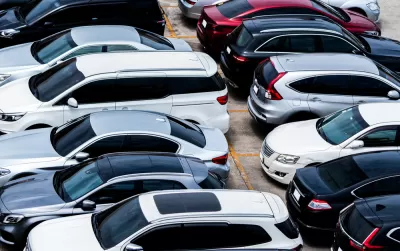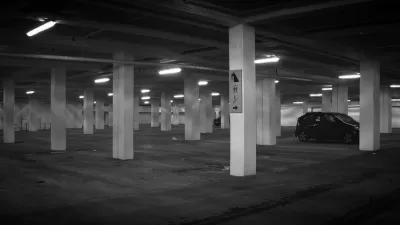As American vehicles grow taller, wider, and longer, more of them are having a hard time fitting in traditional parking spaces.

“Increasingly, cars are too big for parking spaces, especially in parking garages and other paid parking lots where developers pay close attention to space size,” writes Aaron Gordon in Vice. “Like the proverbial frog in a slowly heating pot of water, our cars have gotten ever-so-gradually bigger with each passing year, but the parking space standards have barely budged.”
Gordon describes the process by which parking lot designers decide space sizes, which uses the 85th percentile car size. “This approach to designing parking spaces has historically served the parking industry well, ensuring space sizes accommodate the vast majority of American cars and leaving about 20 inches of space for people to open their doors and maneuver on either side.”
But now, “the 85th percentile method is not capturing the changes in the car sizes. The size of the 10th percentile car has exploded. The size of the 50th percentile car has grown tremendously. The size of the 70th percentile car has also grown. But the 85th percentile car is essentially the Ford F-150, which is much taller and longer than it used to be, but no wider.”
With parking spaces costing thousands or even tens of thousands of dollars each to build, even a few inches can make a significant difference in a project’s budget. To build larger spaces, developers will have to raise the cost of parking for everyone—or just for larger cars, like some parking lots in cities like New York already do. “It’s easy to imagine the backlash that may ensue from any effort to charge people with large vehicles more for parking, even though the suggestion that people who use more of something should pay more than people who use less is one of the most basic tenets of economic theory and the basis of capitalism.” But larger cars don't just take up more space—they pose increased safety risks, too.
FULL STORY: American Cars Are Getting Too Big For Parking Spaces

Planetizen Federal Action Tracker
A weekly monitor of how Trump’s orders and actions are impacting planners and planning in America.

Chicago’s Ghost Rails
Just beneath the surface of the modern city lie the remnants of its expansive early 20th-century streetcar system.

San Antonio and Austin are Fusing Into one Massive Megaregion
The region spanning the two central Texas cities is growing fast, posing challenges for local infrastructure and water supplies.

Since Zion's Shuttles Went Electric “The Smog is Gone”
Visitors to Zion National Park can enjoy the canyon via the nation’s first fully electric park shuttle system.

Trump Distributing DOT Safety Funds at 1/10 Rate of Biden
Funds for Safe Streets and other transportation safety and equity programs are being held up by administrative reviews and conflicts with the Trump administration’s priorities.

German Cities Subsidize Taxis for Women Amid Wave of Violence
Free or low-cost taxi rides can help women navigate cities more safely, but critics say the programs don't address the root causes of violence against women.
Urban Design for Planners 1: Software Tools
This six-course series explores essential urban design concepts using open source software and equips planners with the tools they need to participate fully in the urban design process.
Planning for Universal Design
Learn the tools for implementing Universal Design in planning regulations.
planning NEXT
Appalachian Highlands Housing Partners
Mpact (founded as Rail~Volution)
City of Camden Redevelopment Agency
City of Astoria
City of Portland
City of Laramie





























